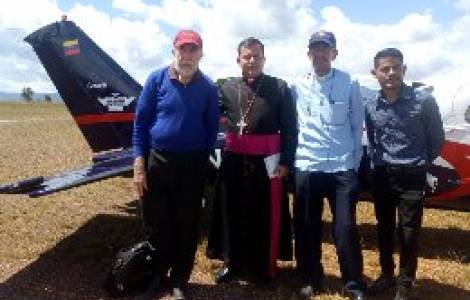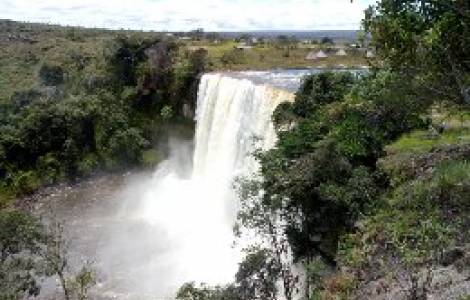Bolívar (Agenzia Fides) - "In these first hundred years since the canonical establishment of the Apostolic Vicariate of Caroní, the Capuchins have carried out a difficult and exciting mission. They have devoted almost a century to the pastoral care of our indigenous brothers and sisters", says Bishop Gonzalo Alfredo Ontivares Vivas, who has been Vicar Apostolic of Caroní for a year and a half and who provides pastoral care to the indigenous Pemòn people, to Fides.
In particular, since July 2021 the Catholic Diocese of San Cristóbal has been collaborating with the Apostolic Vicariate of Caroní (see Fides, 21/7/2021). A sign of growth and missionary maturity of the local Church, called to take charge of an ecclesiastical circumscription that the Venezuelan bishops have described as a "pioneering experience" on the occasion of the 100th anniversary.
"Faith and belonging to the Church are two interrelated factors. Being here is also an opportunity to strengthen the faith of those who go on mission", continues Bishop Ontivares, who described the Capuchin Fathers as "the silent custodians of the fascinating experience of the teaching and the transmission of the faith in this time".
Bishop Gonzalo Alfredo Ontivares Vivas, born in 1968 in the diocese of San Cristóbal, had the desire to go on a mission from an early age. "Since there was talk that the Diocese of San Cristóbal could take over the Apostolic Vicariate of Caroní, I thought the time had come to go on a mission and perhaps follow the new bishop and the priests who would accompany him. Then when the news came that the Pope had appointed me as bishop and vicar, I said to myself that things really do not happen because and when I have planned them, but for the moment, the day and the hour in which God wants them to happen. I am experiencing this time of mission as an experience of faith that God had reserved for me for some time, and now the time has come to live it and enjoy it".
For more than a year Bishop Ontivares' work has consisted in observing this new reality embedded in a completely different culture. "From a socio-cultural point of view, the cosmological and cosmogonic vision of the indigenous peoples has a decisive influence on their lives and their outlook on life. Many of them - the Vicar Apostolic continues on his experiences - live in passivity, contemplating the Church and all those who come to their territories as those who have to bring food and drink. Some beliefs have also led them to remain in a state of underdevelopment. In some cases, for example, they have refused to run power lines in their territories and are now living in darkness and isolation. In this scenario, the exploitation of mines, pollution of rivers, destruction of wildlife, introduction of drugs, alcohol, prostitution, human trafficking and lack of workplace safety measures are increasing".
Ten priests, four pastoral seminarians and two young missionaries from the Pontifical Mission Societies of Venezuela are currently working in the 80,000 square kilometers of the Vicariate. "We must not consider the mentality of the indigenous people and Creoles who live in this area as an obstacle, but as an existential reality in which the life of our Pemón ethnic group develops," Bishop Ontivares told Fides. The people belonging to this people, according to the Vicar Apostolic, “are generally sociable and helpful. I have witnessed this myself in many concrete and revealing situations that surprise and evangelize us.
Like when you are invited to the "tumaconseró", and everyone comes to eat, and share the food on the table, in community, as a gesture of solidarity and closeness to everyone". In these gestures of everyday sharing and human closeness, the seed of the Gospel can be found easy to sow and one can confidently wait for it to bear fruit, so that all may grow in the joy of meeting Jesus and being embraced by him. (EG) (Agenzia Fides, 14/2/2023)

